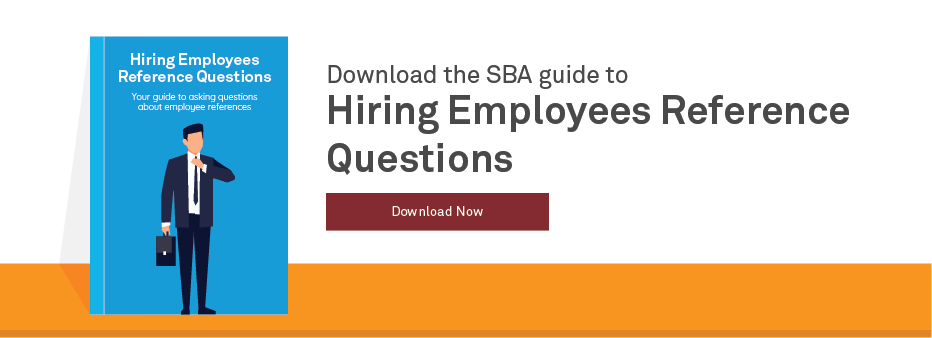Before you sign a contract with a third-party logistics provider or even with a new cleaning service, you probably ask for some case studies, read reviews online, or at least check their Better Business Bureau rating. Even when choosing a lunch spot for that important meeting with your soon-to-be big account, I’m willing to bet you tap Yelp to see how many stars it has and read a review or two to make sure the place isn’t too loud.
Why, then, wouldn’t you take the time to reference check before hiring new employees?
Any time you hire a new employee, you gain an opportunity and a risk. They could end up being your best team member, making a huge difference at your company…or they could be a bad hire that costs you time, money, and morale. Before you take the leap and extend an offer, asking the right reference check questions can help you make an educated decision. Follow this formula:
- Get context
- Verify facts
- Give context
- Uncover red flags
- Assess fit
Gain Context and Verify Facts: Questions to Ask References First

Let’s say you’re about to hire Jane, but you’re wise and decide to call her references before extending an offer. After exchanging greetings with the reference and explaining why you’re calling, start with the following introductory questions to gain valuable context:
- How do you know Jane?
- In what capacity did you work with Jane?
- How long did you work with Jane?
These questions should help you determine how heavily to weigh each reference’s answers in your hiring decision. Once you understand the person’s relationship to Jane, you can decide whether it makes sense to ask them to verify these important facts: dates of employment, job title(s), responsibilities, why Jane left (if applicable), and if Jane is eligible for rehire at that employer.
The aim here is to ensure that Jane has been truthful, but don’t just stop there. Head to the next section to uncover whether her references’ perceptions of Jane line up with her own ideas about her performance, strengths, and weaknesses.
Pro Tip: Depending on the circumstances, and the reference’s relationship to your candidate, they may not have all the answers you need. If none of your candidate’s references can verify facts such as tenure and job responsibilities, you can usually call past employers’ main lines or HR departments to do so.

Assess Aptitude, Skills, and Fit: Five Types of Reference Check Questions
You can make a more informed hiring decision by asking the five types of reference check questions below. Insights from people who have worked with Jane can help you decide whether to hire her, better understand how to manage her, and plan for her first months on the job. Listen not only for red flags, but also for valuable nuggets on how to play to her strengths and plan for her weaknesses.
Offer Context (question 1)
Before you jump in, give the person some context about what you’re looking for by asking them the following question. This will set them up to answer the rest of your questions with a full understanding of what you need:
- I’m considering Jane for [job title]. She’d be responsible for [responsibilities]. Do you think she could perform well in this role, and why or why not?
Gain an Understanding of Strengths and Weaknesses (questions 2-3)
Next, ask about her strengths and weaknesses. You probably asked Jane these same questions, but it can be hard to give an honest answer about yourself. You’ll benefit by getting an outside perspective on Jane, especially from people who have worked with her.
When listening to the answers, keep in mind that most people have a few weaknesses. This doesn’t mean you shouldn’t hire them. Knowing Jane’s weaknesses ahead of time can give you ideas about how to best help her develop. And asking about Jane’s strengths can help you understand the immediate impact she could make, so you can plan what you’d like her to tackle during her first months on the job:
- What are Jane’s weaknesses, and do you feel she could overcome them with adequate training?
- What are Jane’s strengths and how did she use them?
Uncover Red Flags and Discover Whether the Candidate Will Be a Good Fit (questions 4-10)
This next set of questions can help you discover whether there are reasons not to hire Jane. And even if there aren’t any red flags, the references’ answers can help you prepare for how best to manage Jane and decide whether she’ll work well with your existing team and thrive in your office culture:
- How did Jane handle challenges, whether pressure to meet a deadline, stress with a tough goal, or conflict with colleagues?
- Could you describe Jane’s working style? What’s it like to work with her?
- How well did Jane work with others?
- Did Jane have any issues with colleagues and/or management?
- Do you have any advice for how to manage Jane?
- Did Jane prefer to work on her own or as part of a team?
- What role did Jane take on when part of a team? (for example, leader, encourager, organizer, planner?)
Determine Potential for Future Growth (questions 11-12)
If you are looking to hire someone who can not only help your company grow but also grow with your company and take on more responsibility, then consider asking the following:
- Would Jane make a good manager? Why or why not?
- Was Jane promoted or given additional responsibilities at any point? Why or why not?
Ask Closing Questions (questions 13-15)

Give the reference one more chance to add anything that you should know but didn’t ask:
- If you could work with Jane again, would you want to?
- Is there anything else I should know about Jane that would help me make this hiring decision?
- Can you think of anyone else I should speak to?
Pro Tip: Keep in mind that Jane’s references may have busy schedules, so after you give them the introductory context about your open position, plan to ask them the most important questions first, based on your priorities for the role and any concerns you may have.
You may think that doing a reference check isn’t a great use of your time, especially if you’re busy. After all, who is going to give you the number for someone who might give them a bad reference? But the right references can provide a wealth of knowledge about everything from your next hire’s working style, to their potential for growth, so make the time to call them.
The knowledge you gain could not only save you from making a bad hire, but also help you better plan to welcome a talented new team member. Employees are an investment, so plan to make the most of them — from their very first day!






I found this article very helpful. As noted in earlier comments, you would not necessarily ask ALL these questions, but it is good coaching for those of us who are Dept-of-One for HR. Our policy has been to only confirm dates of employment and title of position when we are called for a reference. Good piece, very relevant.
Thanks for the feedback Linda!
From my extensive experience no former employer will answer any of these questions. They will only confirm the dates of employment
While I appreciate the intent of the article, I have to agree with those that feel the questions are unrealistic in the real world.
They seem to be rather intrusive to the reference – almost as though the reference is being interviewed.
Dates of employ, role or position are really the only questions that seem appropriate in the real world – anything of more detail may potentially be an opening for litigious follow-up
The point is well made that testing an employee is the best reference. Skills, work ethic, adaptability, potential – these are strengths to build on. After all, an employee may succeed in one work environment where they were less successful in another prior – or vice-versa.
Opportunity is one of the most prolific motivators
The only questions i would answer would be job title, dates of employment, and whether or not I would rehire them. The last question tells it all.
I think we all understand that the amount of info you will get varies widely. I have been successful in getting people to open up even when they started with saying that cannot say anything. Getting into a friendly conversation can and does work. This article has some very good good questions that I plan to put on my list. As a law enforcement background investigator for decades I can say the most important question is the last one, “Can you think of anyone else I can speak with?” People give references that are safe, secondary sources can expose those things we are looking for. Thanks Anne, good job!
Everyone,
We have a radiology practice in central Missouri with under 50 employees. When I call on references it is nearly impossible to get any information out of references unless they are the candidates personal references. Unfortunately it can be difficult to trust personal references.
Employers, HR departments etc. provide little to no information. The most valuable question I ask is, “Would you hire this employee again and I will get a yes or no answer”.
Anne, I just shared this article on my facebook page. It really does contain a useful set of questions. Thanks to those who commented, I added a caution that no one should anticipate being able to ask all these questions.
For the past twenty-two years our firm has conducted recruitment projects for senior positions working as fundraising professionals within the public sector. I am surprised that individuals have indicated that you can only ask a very limited number of questions and that many people will not comment at all. Our interviews are done by an employee who is a specialist. She doesn’t know the candidate or the person who is providing the reference. Her job is to ask questions that include items specific to the particular positions while other questions are commonly related to personal and character aspects. She writes exactly what the reference says without editing for language or usage. I do not know of a time when a reference refused to answer all of our five pages of questions – we ask about 20 questions in total.
I would say that the questions asked about a candidates weaknesses should be presented in a much better fashion—than is suggested here—in order to obtain a more accurate response. Don’t make your reference strain or feel badly about discussing areas where improvement could be achieved. Try this…”If we could make this candidate a perfect 10 for the position described, what areas would need further development?” What we are saying here is that no-one is perfect and that is human. Many shortcomings can be managed if the employer takes the time to differentiate between those that are certainly marginal deficiencies from the actual “deal breakers.”
I would advise those having difficulty getting people to talk should follow a different approach.
A lot of good ideas here. I suggest you figure out the best 3-4 questions that help you determine fit with your culture and integrity. But realize that references are a trust system. You have no idea who is on the other end of the phone unless you do your own research to get to that person, such as through LinkedIn. That’s in fact, one of the better ways to find a colleague who might give you an honest opinion rather than a hand-selected reference from the person you’re seeking a reference on.
You can sometimes get around reluctance to provide a reference by getting a release signed by the applicant. But in any case, someone can be a colossal failure at one organization and a success at another. A slow and methodical work style may be ideal for some companies, but would be disaster in others. The opposite is just as true – and there are many other dimensions of how one does the job.
Your best bet is to see how someone actually works yourself. Call it a working interview, pay them $15/hour and give it 4 hours to see if you like the way the person interacts with your team and your customers, and whether he or she has the needed skills to do the job. Make a salesperson sell or present; make a front desk person answer your phone; make a painter paint. Some people who do wonderful interviews and have incredible references can’t do your job the way you want it done. So find out for yourself.
I’ve been pleasantly surprised with reference calls I’ve made. Some have been anxious to spill the beans and have likely saved me a lot of grief with a bad hire. While I wouldn’t personally take the risk and reveal anything more than basic verification questions myself, it’s worth it to ask as many questions as possible – you never know…
Our small business’ policy is to only confirm position and dates of employment.
So I’m curious to hear how The Hartford responds to reference checks.
The best reference that you get is usually an attempt to get the person employed somewhere else to prevent unemployment or issues. When I called for a reference on a person in previous years, the person told me that the individual had a responsible position and was given full latitude in their employment….what they did not tell me was the person was caught stealing. Employers do not have a tendency to air dirty laundry for you to repeat. The article is a wonderful approach in a non realistic world.
I think this article was great for small business owners, like myself, who are trying to find out more information on the do’s and don’ts in hiring. I have always wondered what are the appropriate questions to ask a reference about an applicant. And of course I know we do not HAVE to ask them ALL of those questions, but it was a great guideline to show me how to ask questions, what to look for in the answers and also what not to say, so I do not break any laws! Thanks so much for writing this article. I do appreciate it and found the info very helpful~
Thank you Riech!
In light of some of the comments, please keep in mind that these questions are all suggestions. To one commenter’s point, the person you reach may not have a lot of time to talk, so narrow down your priorities prior to calling or emailing. Also, many times candidates include former colleagues or more personal references — people who won’t automatically refer you to their HR department.
Good points, Anne.
We are going to hire a person in the next few month. Would the local college be the first to check with?
We are in the process in few months of hiring a pressman. Would the local community college be a
good starting point?
Unfortunately, in this age of operating solely for fear of being sued, the only thing most people will tell you about an applicant is whether or not they worked for that firm and the dates of their employment. Even the question of are they eligible for re-hire is generally met with no comment. 95% of all companies I ask for a reference from never even give the courtesy of speaking with anyone in the first place. It seems all anyone does these days is pass bad employees off on someone else.
Our business is in a small town. What is your advice if the candidate’s reference is someone that you don’t trust or respect?
This article gave me some good ideas for our small business, keep them coming. For people like me who have been given the task of taking on the HR role at my company without any formal training, these articles are priceless.
Please email me the article
Cut the author some slack guys. The title of this website is “SMALLBIZ AHEAD”. Most of us small-biz types don’t have an HR department to refer those call to. And, yes, people do discuss former employees or associates or industry peers if you approach them in a friendly but professional way, especially in industries where we all get to know one another over time.
I thought this was a good article with useful questions. As the “C” suite HR guy in our firm (also the “C” suite financial, sales and operations guy – we are a small biz after all) I thought there were some thought provoking points raised. Thank you Anne. Well done.
While this is a well written article on possible questions, it’s probably the more ridiculous article I’ve ever seen as a” C” suite HR professional. Are you kidding me? Getting a reference to answer 2 questions, let alone 18, is nearly impossible. In this current age of extremely litigious applicants, you can’t expect references to spill their beans on an previous applicant. Pick out 3 to 4 of these questions, then ask the reference those. This article has great intentions, but practically zero applicability in the ‘real world.’ Ask references for 4 minutes of their time, and drill down to 3-4 questions— and you’ll get more participation, than if you try to take 20 minutes of someone’s time. Get real!
Hi Jim,
These are suggestions for questions. We’re not suggesting you ask all 18 of them!
Elizabeth
Do people really discuss candidates anymore? We are told to refer all calls to HR.